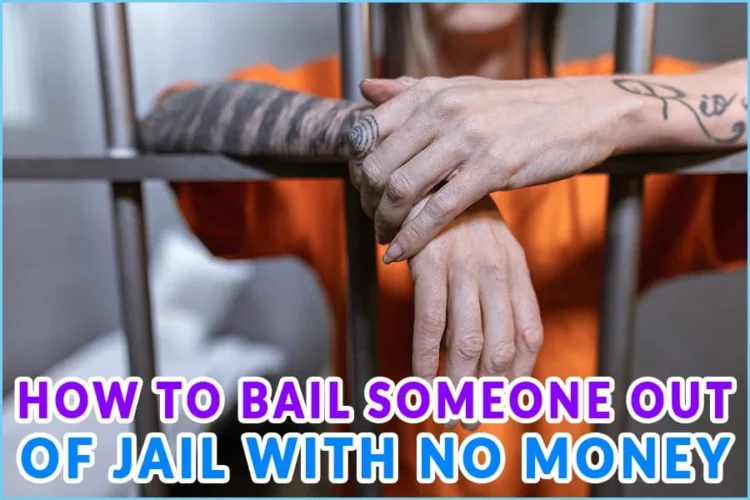Have you ever wondered how to bail someone out of jail with no money? When someone close to you is arrested and needs bail money, the stress can be overwhelming.
Not only do you have to worry about their well-being, but also how you will afford their bail.
Bailing someone out of jail can be an expensive and daunting task. So, what do you do? The good news is that there are ways to bail someone out of jail without spending a fortune.
This article provides some legal advice on how to handle the tricky situation. But first, let’s address the subject matter.
How To Bail Someone Out Of Jail With No Money
If the police arrest someone, they can ask the court to release them on their own recognizance. It means that the accused promises to appear in court when required and does not have to pay bail. However, they must sign a written promise.
The court will consider several factors when deciding whether to release someone on their own recognizance. Therefore, not everyone can qualify for this no-cost bail.
The Process Of Bailing Someone Out Of Jail
The process of bailing someone out of jail can be complicated and stressful. It’s important to know what to do and who to contact to quickly get your loved one released from custody.
- The first step is to find out if the person is eligible for bail. In most cases, bail is available for defendants who’ve been charged with a crime before a conviction.
- Next, you need to gather the necessary information and documents; this includes the defendant’s name, date of birth, and occupation.
- You will also need the name of the criminal charge(s) and the amount of bail set by the court.
- The final step is to post bail. In most cases, you can do this at the courthouse or jail. The defendant will be released once you’ve posted bail.
Release On Own Recognizance (O.R)
When the police arrest someone, they can take them to the station for booking and then to court for arraignment.
The defendant appears before a judge, who decides whether to release the person on their “own recognizance.”
“Own recognizance” is a legal term that means the defendant’s release is without posting bail. It means that the person promises to show up in court when they are supposed to. If the person does not show up, the police can arrest them again.
The judge will consider several factors when making this decision, including:
- The nature of the charge
Judges are more likely to release defendants charged with minor offenses. Violent crimes and felonies typically don’t qualify for release on recognizance.
- Your criminal history and likelihood that you will flee if released
If you have a criminal history, the court may decide that you are more likely to re-offend. The court may also consider the severity of your criminal record when deciding on the release.
If you have a history of violent offenses, the court is less likely to release you on your own recognizance. However, a small past offense such as shoplifting won’t affect your R.O.R.
Furthermore, if you are considered a flight risk, the court may require that they hold you in jail until arraignment.
The belief is that you are also more likely to flee the jurisdiction if released on your own recognizance.
- Your ties to the community
Your ties to the community can affect release on your own recognizance in a few different ways.
You are more likely to be released on your own recognizance if you have close ties to the community. These ties are family or friends who live in the area.
If you have a job in the community or are involved in volunteer work, it can influence your release. On the other hand, if you do not have strong ties to the community, you may not qualify.
- Whether or not you’re a danger to the community.
If the court feels you are a danger to the community, they are less likely to consider your recognizance.
If a defendant’s release is on their own recognizance, they must appear in court on the scheduled date. If they fail, a judge may order their arrest and hold them in jail until their next court date.
However, you should note that the court could deny your request for a release on your own recognizance. That means that you will have to remain in custody until your trial, or you can find an alternative.
Secure A Bail Bond From A Licensed Bond Agent
If release on your own recognizance is unavailable to you, there is one final option that you can try.
You can contact a bail bond company and ask them to help you. Bail bond companies will usually be able to get the defendant out of jail for a fee.
A bail bond is a document that promises the court the defendant will appear for all scheduled court proceedings. It’s a financial agreement between the defendant and the bonding company.
The company agrees to pay the full bail amount to the court if the defendant does not appear. The amount of bail varies depending on the severity of the crime and the person’s criminal history.
The cost of a bail bond varies depending on the state but is typically 10% of the total bail amount.
So, if the judge sets bail at $10,000, the bail bond company will charge a fee of $1,000. This fee is non-refundable, even if the defendant appears in court as required.
The bail agent will also charge a fee for their services. Bail agents are licensed and regulated by the state in which they operate. The arrested person will need to put up collateral to secure the bond.
If they don’t show up for their court date, the bond agent has the right to possess the collateral.
How To Find A Bail Bondsman
When you need a bail bond agent, it’s important to know where to look. This process can be daunting, especially if it is your first time.
The best place to start is by asking around for recommendations. Friends, family, and co-workers are good sources of information.
However, you might not know anyone who has recently had to bail someone out of jail. Your next best bet is to do a quick online search.
Many websites list bond agents in your area; be sure to read reviews before selecting a bondsman. You should see if anyone has filed complaints against the bail bondsman.
It is also important to ensure that the bondsman you choose is licensed and insured. Once you have done your research, get quotes from several bail bond agents before deciding.
What Are The Benefits Of Using A Licensed Bail Agent?
There are many benefits to working with a licensed bail agent:
- First and foremost, agents are available 24/7 to help their clients.
- They also have extensive knowledge of the criminal justice system and can provide valuable advice during this difficult time.
- The bail agent will work quickly to get the accused person released from jail. Licensed bail agents have the authority to post bail for their clients, allowing them to get out of jail quickly.
- The bail agent will work with the accused person to develop a payment plan that fits their budget.
- It’s an affordable option to pay the full amount. Cash bail requires you to settle the total bail amount. A bond is only 10% of that.
What If You Violate Release On Your Own Recognizance?
When you have a notice of your court date, the court expects you to appear in court on that date. A bench warrant may be issued for your arrest if you do not appear. If they re-arrest you, you’ll go before the court, and they’ll hold you in jail until your trial.
A bench warrant is an order from a judge to arrest and bring a person before the court. The bench warrant is typically issued when the person fails to appear in court after being ordered.
The court may find that you have violated the terms of your bail agreement. That will affect your trial even more. And in the future, you may likely not post bail again.
Conclusion
The purpose of this article was to guide on how to bail someone out of jail with no money. There’s only one way of bailing one out of jail without money; through release on your own recognizance.
The judge decides whether you qualify for such a release by considering several factors. However, if you don’t qualify, you may need to find a bail bond agent.
A bonds agent will be helpful if you do not have the money necessary to post the entire bail. You can quickly get your loved one out of jail without breaking the bank.










